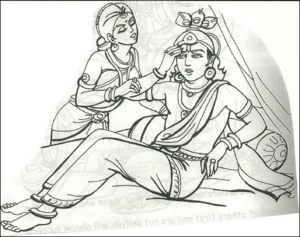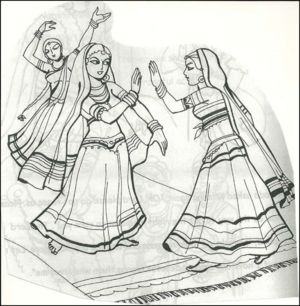Talk:Ātmanivedanaṃ - Surrenders Completely to Bhagavān (Ātmanivedanaṃ)
By Vishal Agarwal
This involves surrendering oneself completely to Bhagavān – his body, senses, mind and his very ātmā to the Lord. Whatever he thinks, whatever he says, whatever he does is for the sake of the Lord alone and he has no selfish motive in any action. This characteristic of the highest Bhakti is mentioned in the Vedas too, for instance, in the mantra below-
I have completely given my mind to you; sit like a king at the celebration of Yajna in your honor. Rigveda 10.43.2
The Bhagavad Gita too says- Whatever you do, whatever you eat, whatever oblations you offer, whatever you give, and whatever austerities you perform, Son of Kunti, make it an offering to Me. Gita 9.27 Fix your mind on Me, be devoted to Me, perform your worship to Me, make reverence to Me. Thus, having disciplined yourself in Yog, with Me as your Supreme Goal, you shall indeed come to Me. Gita 9.34
He who does his karm for Me, who considers Me as Supreme, who is devoted to Me, free from all attachment, who is free from enmity towards any creature, he comes to Me, Pāṇdava. Gita 11.55
The Gopī-s of Vrindavan
Once Sage Narada went to Krishna and complained, “You always keep praising the love and devotion of the illiterate milk-maids (Gopis) of Vrindavana. Your wives are very upset because you seem to like the Gopis more than them. What is so special about the devotion of the Gopis?”
Krishna said he will answer this question later because he had a headache. When Narada offers to get some medicine to cure the headache, Krishna declines, saying, “Only the dust from the feet of my devotee can cure my headache.”
Narada goes to Krishna’s wives, friends and relatives one by one but they all refuse to give the dust from their feet saying, “If we give the dust of our feet to our Lord for his head, we will go to hell. How can we be so disrespectful towards our Lord?” Narada goes to every place in the universe and asked every devotee if they could give the dust of their feet to apply to the forehead of the Lord. But they all refused for the same reason that they cannot insult Krishna.
Dejected, Narada returned to Krishna and told him that no one in the universe wanted to give the dust of his or her feet to cure Krishna’s headache. Krishna asked, “But Narada, did you go and ask the Gopis of Vrindavan for the dust of their feet?”
Narada laughed and said, “Surely you must be joking Bhagavan! What can the dust from the feet of those illiterate and uncouth rural women tending cattle do to get rid of your headache. But if you insist, let me go there too.”
At Vrindavan, the Gopis welcomed the sage and eagerly asked him if he had met Krishna, and how He was doing. Narada told them that Krishna was doing fine except that he had an excruciating headache. The Gopis was saddened, and asked, “Don’t you have good physicians in Dwaraka for prescribing some medicine to cure the headache?” Narada said, “Nothing will work. Krishna thinks that only the dust of the feet of his devotees will cure his headache.”
As soon as the Gopis heard this, one of them placed her most expensive shawl on the ground. All of them started stomping their feet on the clay on the ground and then they dusted off their feet on the shawl. The Gopis then tied the shawl filled with dust into a bundle and presented it to Narada.
Narada was aghast. He scolded the Gopis and said, “How ill-mannered and disrespectful can you be towards Krishna! You claim to be His servants, His devotees, and yet you do not think twice before throwing the dust of your feet on his head! Don’t you know that you will incur his anger with your actions? You can go to hell!”
The Gopis said, “We do not mind going to hell, nor do we mind facing his anger. All we want is that his headache should go away and that he feels fine again. So please do not wait here. Hurry, take this dust to our Lord immediately. For His comfort, we do not mind suffering endlessly.”
Narada was overwhelmed with the reply of Gopis. Now he understood why Krishna constantly praised their devotion. The love and devotion of Gopis, unlike that of others, was completely unselfish and un-demanding. The Gopis did not care for their own welfare. All they wanted was that their Lord should be happy, even if it meant great pain to themselves.



